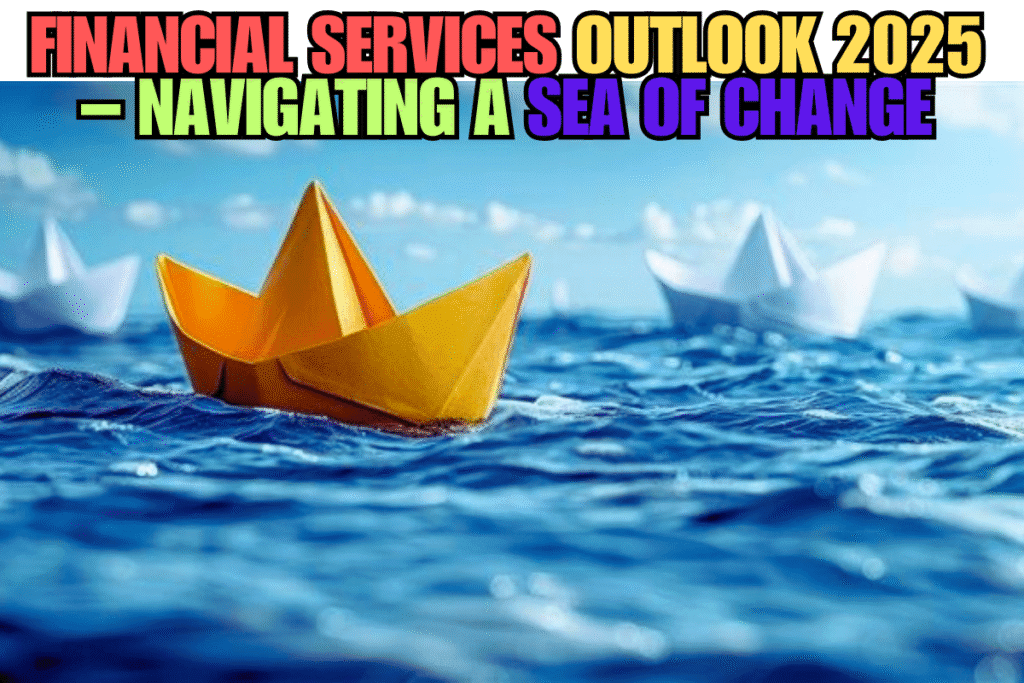The Financial Services Outlook 2025 paints a dynamic picture, one where established norms are being challenged and innovation is the name of the game. As we navigate the currents of technological advancement, evolving customer expectations, and a shifting regulatory landscape, understanding the key trends and potential headwinds is crucial for individuals and institutions alike. This isn’t just about predicting the future; it’s about preparing for it, armed with insights into the forces that will shape how we save, spend, invest, and interact with financial entities.
Having closely observed the financial services sector’s evolution, particularly the rapid acceleration of digital transformation and the increasing emphasis on customer-centricity, I believe 2025 will be a year of both significant opportunity and potential disruption. This exploration delves beyond surface-level predictions, offering a nuanced perspective on the key factors defining the Financial Services Outlook 2025.
The Unstoppable Tide of Digital Transformation
The digital revolution in financial services is far from over; in fact, it’s gaining momentum. The Financial Services Outlook 2025 is heavily influenced by the continued integration of technology across all facets of the industry (Financial Services in 2025: Predictions and Emerging Challenges – Aryza).
- AI Everywhere: Artificial intelligence (AI) is moving beyond chatbots and basic automation to become a core driver of personalized experiences, enhanced fraud detection, and more efficient operations. Expect AI-powered tools to become even more sophisticated in areas like predictive analytics for investment and proactive financial advice (2025 industry outlook: Financial services trends – Slalom).
- The Rise of the Metaverse (Cautiously): While still in its nascent stages, the metaverse presents potential future avenues for financial interactions, from virtual real estate investments to new forms of digital asset exchange. However, widespread adoption in mainstream finance is likely further down the line.
- Cloud-Native Infrastructure: The agility and scalability offered by cloud computing are becoming essential for financial institutions to remain competitive and adapt quickly to changing market demands and regulatory requirements.
Personal Insight: I’ve witnessed the transformative power of cloud-based platforms in enabling smaller fintech companies to compete with established players by offering innovative and scalable solutions without the burden of significant infrastructure investments. This trend will likely continue to democratize the financial services landscape.
Customer-Centricity: The North Star
In the Financial Services Outlook 2025, the focus remains firmly on the customer. Financial institutions are increasingly recognizing that understanding and meeting evolving customer expectations is paramount for success (What does the future hold for financial services in 2025? – RFI Global).
- Hyper-Personalization at Scale: Leveraging data and AI to deliver truly personalized products, services, and advice will be a key differentiator. Customers expect financial interactions to be tailored to their individual needs and goals.
- Seamless and Omnichannel Experiences: Consumers expect to interact with financial institutions seamlessly across various touchpoints, whether online, mobile, or in person. Providing a consistent and integrated experience is crucial for building trust and loyalty.
- Emphasis on Financial Wellness: Financial institutions are increasingly taking a more holistic approach to customer well-being, offering tools and resources to help them manage their finances effectively and achieve their financial goals.
Personal Insight: My own experiences with financial apps that offer personalized budgeting advice and insights have significantly improved my financial management. This trend towards proactive support and guidance will likely continue to shape the customer-institution relationship.
The Evolving Regulatory Landscape
The Financial Services Outlook 2025 is also shaped by a dynamic and increasingly complex regulatory environment (2025 Global financial services regulatory outlook – EY).
- Focus on Cybersecurity and Data Privacy: With the increasing digitalization of financial services, regulators will continue to prioritize cybersecurity and data privacy to protect consumers and maintain the stability of the financial system.
- Regulation of Emerging Technologies: As AI, digital assets, and other new technologies become more prevalent, regulators will grapple with establishing appropriate frameworks to manage the associated risks and opportunities.
- Increased Scrutiny of Non-Bank Financial Institutions (NBFIs): Concerns about systemic risk may lead to greater regulatory oversight of NBFIs, which now constitute a significant portion of the global financial system (Global FSR Outlook 2025: Perpetual Motion | Herbert Smith Freehills | Global law firm).
Personal Insight: The regulatory landscape often plays catch-up with technological innovation. Navigating this evolving environment requires financial institutions to be agile and proactive in their compliance efforts.
The Sustainability Imperative
Environmental, Social, and Governance (ESG) factors are no longer a peripheral concern but are becoming increasingly central to the Financial Services Outlook 2025 (The future of sustainable finance: Key trends for 2025 and beyond – Apex Group).
- Growing Demand for Sustainable Investments: Investors, particularly younger generations, are increasingly seeking investment options that align with their values and contribute to a more sustainable future.
- Integration of ESG Risks into Financial Analysis: Financial institutions are recognizing the importance of incorporating climate risks and other ESG factors into their risk management frameworks and investment decisions.
- Increased ESG Reporting and Transparency: Regulatory pressures and stakeholder expectations are driving greater transparency and standardization in ESG reporting.
Personal Insight: The shift towards sustainable finance reflects a broader societal awareness of environmental and social issues. Financial institutions that fail to adapt to this growing demand risk losing both customers and investors.
The Talent Transformation
The Financial Services Outlook 2025 also highlights a significant shift in the skills and talent required within the industry (Next in banking and capital markets 2025 – PwC).
- Demand for Digital and Data Skills: Professionals with expertise in data science, AI, cybersecurity, and cloud computing are in high demand.
- Importance of “Soft Skills”: While technical skills are crucial, communication, collaboration, and critical thinking remain essential for navigating complex challenges and working effectively in multidisciplinary teams.
- The Rise of Hybrid Work Models: The flexibility and work-life balance offered by hybrid work arrangements are becoming increasingly important for attracting and retaining top talent.
Personal Insight: The rapid pace of technological change necessitates continuous learning and upskilling within the financial services workforce. Organizations that invest in their employees’ development will be better positioned to thrive in the future.
Potential Headwinds and Challenges
While the Financial Services Outlook 2025 presents numerous opportunities, several potential headwinds and challenges need to be considered (Top five risks for financial institutions in 2025 – WTW).
- Increased Competition from Fintechs and Big Tech: Non-traditional players continue to disrupt the financial services landscape, offering innovative solutions and challenging established business models.
- Cybersecurity Threats: The increasing sophistication of cyberattacks poses a significant risk to financial institutions and requires ongoing investment in robust security measures.
- Economic Uncertainty: Global economic conditions and geopolitical instability can impact financial markets and consumer behavior, creating uncertainty for the financial services sector.
Navigating the Future with Agility and Innovation
The Financial Services Outlook 2025 underscores an industry in constant motion. The confluence of rapid technological advancements, evolving customer expectations, a dynamic regulatory landscape, and a growing focus on sustainability is creating both unprecedented opportunities and significant challenges. Success in this environment will require agility, a deep understanding of customer needs, a proactive approach to regulatory compliance, and a commitment to innovation. Financial institutions that embrace these trends and adapt their strategies accordingly will be best positioned to navigate the future and thrive in the years to come.
What are your thoughts on the Financial Services Outlook 2025? Which of these trends do you believe will have the most significant impact on the industry? Share your insights in the comments below!



